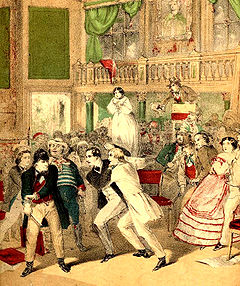
The Octoroon
Encyclopedia

Dion Boucicault
Dionysius Lardner Boursiquot , commonly known as Dion Boucicault, was an Irish actor and playwright famed for his melodramas. By the later part of the 19th century, Boucicault had become known on both sides of the Atlantic as one of the most successful actor-playwright-managers then in the...
, which opened in 1859 at The Winter Garden Theatre
The Winter Garden Theatre (1850)
The first theater in New York to bear the name The Winter Garden Theatre had a brief but important seventeen-year history as one of New York's premier showcases for a wide range of theatrical fare, from Variety shows to extravagant productions of the works of Shakespeare...
. Boucicault adapted the play from the novel The Quadroon by Thomas Mayne Reid
Thomas Mayne Reid
Thomas Mayne Reid , was an Irish-American novelist. "Captain" Reid wrote many adventure novels akin to those written by Frederick Marryat and Robert Louis Stevenson. He was a great admirer of Lord Byron...
(1856). It concerns the residents of a Louisiana plantation called Terrebonne. The play was very popular in its day, and sparked debates about abolition
Abolitionism
Abolitionism is a movement to end slavery.In western Europe and the Americas abolitionism was a movement to end the slave trade and set slaves free. At the behest of Dominican priest Bartolomé de las Casas who was shocked at the treatment of natives in the New World, Spain enacted the first...
and the role of theatre in politics. It contains elements of Romanticism
Romanticism
Romanticism was an artistic, literary and intellectual movement that originated in the second half of the 18th century in Europe, and gained strength in reaction to the Industrial Revolution...
and melodrama
Melodrama
The term melodrama refers to a dramatic work that exaggerates plot and characters in order to appeal to the emotions. It may also refer to the genre which includes such works, or to language, behavior, or events which resemble them...
.
The word octoroon means one eighth black. Half black is a mulatto
Mulatto
Mulatto denotes a person with one white parent and one black parent, or more broadly, a person of mixed black and white ancestry. Contemporary usage of the term varies greatly, and the broader sense of the term makes its application rather subjective, as not all people of mixed white and black...
, a quarter black is a quadroon
Quadroon
Quadroon, and the associated words octoroon and quintroon are terms that, historically, were applied to define the ancestry of people of mixed-race, generally of African and Caucasian ancestry, but also, within Australia, to those of Aboriginal and Caucasian ancestry...
.
The Oxford English Dictionary
Oxford English Dictionary
The Oxford English Dictionary , published by the Oxford University Press, is the self-styled premier dictionary of the English language. Two fully bound print editions of the OED have been published under its current name, in 1928 and 1989. The first edition was published in twelve volumes , and...
cites The Octoroon with the earliest record of the word mashup with the quote: "He don't understand; he speaks a mash up of Indian, French, and Mexican." [Boucicault's manuscript actually reads "Indian, French and 'Merican." The last word, an important colloquialism, was misread by the typesetter of the play.]
Act I
George, the nephew of plantation owner Mrs. Peyton, returns from a trip to France to find that his aunt's plantation is in dire financial straits as a result of his late uncle's beneficence. Jacob McClosky, the man who ruined the late Judge Peyton, has come to inform them that their plantation will be sold and their slaves auctioned off separately. Salem Scudder, a kind yankee, was Judge Peyton's business partner; though he wishes he could save Terrebonne, he has no money.George is courted by the rich Southern belle
Southern belle
A southern belle is an archetype for a young woman of the American Old South's upper class....
heiress Dora Sunnyside, but he finds himself falling in love with Zoe, the daughter of his uncle through one of the slaves. Dora, oblivious to George's lack of affection for her, enlists Zoe's help to win him over. McClosky desires Zoe for himself, and when she rejects his proposition, he plots to have her sold with the rest of the slaves, for he knows that she is an octoroon and is legally part of the Terrebonne property. He plans to buy her and make her his mistress.
Act II
McClosky intercepts a young slave boy, Paul, who is bringing a mailbag to the house which contains a letter from one of Judge Peyton's old debtors. Since this letter would allow Mrs. Peyton to avoid selling Terrebonne, McClosky kills Paul and takes the letter. The murder is captured on Scudder's photographic apparatus. Paul's best friend, the IndianNative Americans in the United States
Native Americans in the United States are the indigenous peoples in North America within the boundaries of the present-day continental United States, parts of Alaska, and the island state of Hawaii. They are composed of numerous, distinct tribes, states, and ethnic groups, many of which survive as...
Wahnotee, discovers Paul's body; he can speak only poor English, however, and is unable to communicate the tragedy to anyone else.
George and Zoe reveal their love for each other, but Zoe rejects George's marriage proposal. When George asks why, Zoe explains that she is an octoroon, and the law prevents a white man from marrying
Miscegenation
Miscegenation is the mixing of different racial groups through marriage, cohabitation, sexual relations, and procreation....
anyone with the smallest black heritage. George offers to take her to a different country, but Zoe insists that she stay to help Terrebonne; Scudder then appears and suggests that George marry Dora. With Dora's wealth, he explains, Terrebonne will not be sold and the slaves will not have to be separated. George reluctantly agrees.

